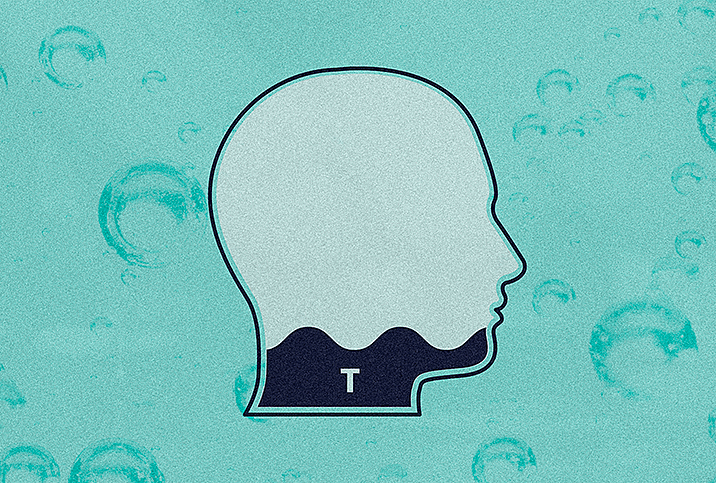Know the Symptoms of Low Testosterone

Men and women alike produce the sex hormone testosterone. Men, however, have a much higher percentage of testosterone, which is mostly produced in the testicles. The hormone helps develop and maintain a man's sexual features and his sexual function; plus, it plays a role in muscle mass, levels of red blood cells, fat distribution and bone density.
Testosterone levels peak during adolescence and decline in later life but generally stay between 300 and 1,000 nanograms per deciliter. When the level falls below 300 ng/dL, the condition is considered low testosterone (low-T), or male hypogonadism. Low-T is common, affecting approximately 40 percent of men over the age of 45.
What causes low testosterone?
There are many potential causes of low testosterone, including injury to the testes, infection, kidney failure, testicular cancer and chemotherapy. Other possible origins include, but are not limited to:
- Aging
- High iron levels
- Problems related to the pituitary gland
- Tumors
- Certain medications
- Alcoholism
- Cirrhosis of the liver
- HIV/AIDS
- Chromosomal problems
- Obesity
- Anabolic steroids
- Kallmann syndrome (KS)
- Sleep apnea
- Estrogen excess
- Hypothyroidism
Signs & symptoms of low testosterone
Low testosterone can impact the mind, body and sexual function. The most common signs and symptoms of low-T are varied:
- Decreased sex drive. Men experiencing low testosterone often report a lowered libido. It is common to experience a decreased sex drive with age, but if the lack of libido stems from low testosterone, the difference will feel significant. Low-T can also lead to diminished sperm production.
- Difficulty getting an erection. Testosterone stimulates the penile tissues to produce nitric oxide, which starts chemical reactions that result in an erection. If your testosterone is too low, you may not be able to achieve an erection.
- Noticeably smaller testes. If you are suffering from low-T, you may notice a drastic reduction in the size of your testes. Your scrotum may feel softer than usual, as well.
- Hair loss. Because hair loss is associated with aging, it can be difficult to diagnose low-T based on this alone. If you are losing body and facial hair in addition to scalp hair, however, it could be due to low-T rather than hereditary factors.
- Fatigue. Even after a good night's rest, you may notice fatigue. You may also lose interest in exercise. Many men who experience extreme fatigue and low energy levels may later identify a connection to low testosterone.
- Sleep problems. Low testosterone can cause insomnia, restlessness and changes in sleep patterns. Studies have shown some men with low-T also suffer from sleep apnea, a serious condition in which breathing stops and starts during sleep. Testosterone replacement therapy, however, can also lead to sleep apnea.
- Mood swings. Low testosterone is linked with psychological and emotional issues such as depression, stress, anxiety and irritability. Testosterone plays a role in how the brain works and can significantly affect your mental health, leading to mood swings.
Treatment options
Low-T is typically treated with testosterone replacement therapy (TRT), which is distributed in the form of a shot, tablet, patch or gel on the skin, and is reported to decrease some symptoms in six weeks. Medications such as clomiphene can also increase your testosterone level. TRT may improve libido, build muscle mass and help prevent bone loss.
Lifestyle changes such as exercising and maintaining a healthy weight can also have a positive effect. Studies show that resistance exercise, like weightlifting, is linked to temporary increases in testosterone.
Supplementation can work for many men instead of resorting to TRT. Libido Boost vitamins provide nutrients that act to keep your testosterone at acceptable levels. Giddy Health supplements use only key ingredients, and those in Libido Boost have been shown to help boost testosterone production. Filled with ashwagandha, longjack and zinc, these capsules use microbead technology for a timed release throughout the day.
Every man is unique, and different bodies respond differently to testosterone replacement therapy and other treatments. Consult your doctor to determine the best treatment plan for you.
If, like too many men, you don't have a regular physician, you need to get one. Giddy telehealth can connect you with a doctor who can answer your questions and evaluate your situation. Many physicians offer video visits, which are a good way to see a doctor quickly since a lot of them have same-day appointments. Giddy telehealth's easy-to-use online portal provides access to hundreds of healthcare professionals whose expertise covers the full scope of medical care, including men's health.

















